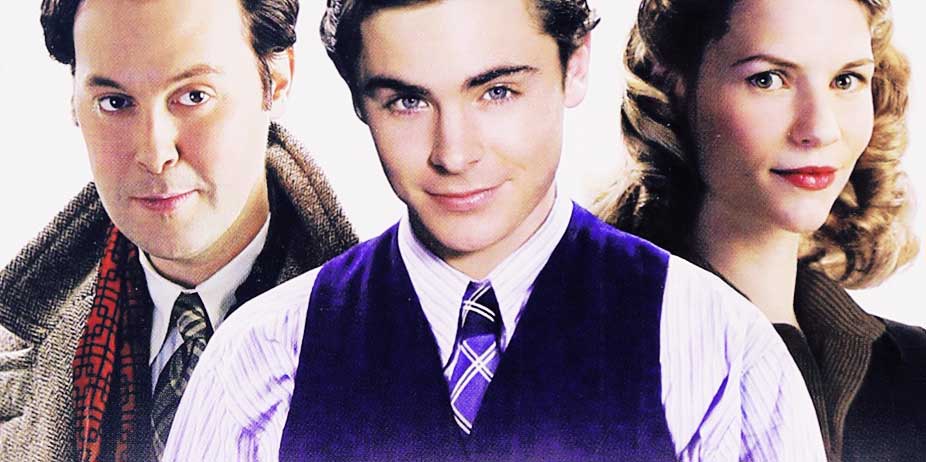 Me
and Orson Welles (2008)
Me
and Orson Welles (2008)
Period films fascinate me -- particularly ones set in the '30's. It was a different era in which much was transpiring in society. Morals and values were shifting, smoking was common, and girls got all "dolled up" to go out on the town. Me & Orson Welles captures the heart of the 30's -- both the good and the bad.
Richard (Zac Efron) wants something bigger for his life than an endless study of English literature. He envisions being an actor... or a singer ... or an artist... or a musician. Because he loves all these things, he is drawn inevitably to the Mercury Theater, which is just about to open its much-touted presentation of Shakespeare's Julius Caesar. He manages to impress none other than Orson Welles (Christian McKay) with his quick thinking and unique talent and is cast in a minor role, as a lute player who sings to Brutus shortly before his death. The production is having trouble getting off the ground. The actors -- and particularly Wells himself -- are self-obsessed, obnoxious, and temperamental. Welles shows up late to rehearsals, making it impossible to go on without him (since he is both the director and starring lead), yells at everyone at the drop of a hat, and is known for hitting on the actresses... and secretaries... and girls on the street.
The one woman seemingly immune to his charms (and those of everyone else) is the starry-eyed Sonja (Claire Danes), who works at the theater as its secretary for no pay in the hope that Welles will introduce her to David O. Selznick, who has just acquired the film rights to Gone With the Wind. None of the boys in the production have a chance at winning over Sonja but she takes an immediate liking to Richard, engaging in mild flirtations with promises of bigger things -- while in the meantime he deals with the ins and outs of theatrical productions.
The film itself is quite an accomplishment, with a host of talented actors, authentic settings and costumes, and truly nuanced performances, particularly from Christian McKay as Orson Wells. He's terrific. There's no other word for it. But Zac Efron also holds his own, and has a great supporting cast that includes Ben Chaplin and Kelly Reilly (she's not onscreen much, but her diva role will not soon be forgotten). I also loved the soundtrack, which is a fun blend of different popular melodies from the era and music that quite simply sounds right for the film. You only ever notice music if it's terribly off, or wonderfully "on," and this score is great. The problems therein lie in the content and the overall lack of any sort of message, other than perhaps that sometimes life hands us experiences for no other reason than to experience them. In that way, the entire journey is rather meaningless and the emotion empty -- although he does have a spark of promise in something "more" for the future in terms of romance.
The other issue I have with it is how frequently Jesus' name is abused -- about a dozen times in different forms, and another eight or nine couplings of God's name with a profanity on top of that. Other foul language (including s**t, SOB, and anatomical terms) pervades the script, usually originating from Wells' mouth as he blasts everyone and everything. There is no violence to speak of, but some underage drinking and sexual implications. Several of the actors reference their inability to get "into Sonja's pants" and make a deal that the first man who can gets $5. Richard winds up winning the bet -- she invites him to spend the night after they have only known one another a week (we see him in her apartment, and the scene ends). He references her as his "lover" in a heated argument with Wells -- who we learn is not only a chronic adulterer (various conversations linger on his multiple girlfriends and pregnant wife) but also occasionally spends the night with Sonja. This, understandably, creates great frustration in Richard, who accuses her of immoral behavior, as well as leaves us with the belief that Sonja is willing to sleep her way to success -- which makes her a tad unlikable. It's an unusual approach, because we want to like Richard and Sonja as a couple as well as individuals, and most of their relationship was cute and sweet and even innocent until the three-quarters mark. Then, I was disappointed in them both.
Where the films succeeds the most is in its depiction of Orson Welles as an individual -- both his good points and his bad moments. In some ways he is unlikable and in others, he redeems himself through amazing talent -- one of the finest moments is when he goes off-script while recording a radio production and improvises a truly touching speech. His fellow actors are at first confused, then enraptured. I think in many ways, that is what makes the film so good in a purely cinematic manner -- and its illustration of the conversation held by its characters. We see just enough of the final result to make it powerful, and even though immoral, the emphasis on "quadruple" spaces is immensely clever. But while I enjoyed it overall, there was just something missing that would have completed it in my mind -- or maybe it's just that my ears burned a little too much, far too often.
